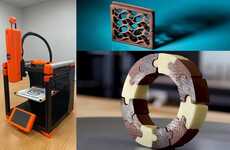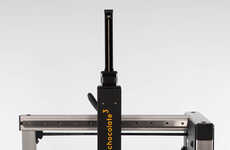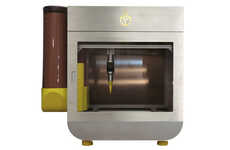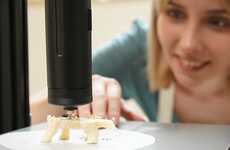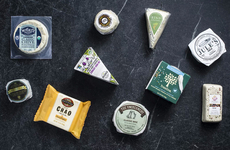
Scientists are Experimenting with Additive Manufacturing and Dairy Products
Laura McQuarrie — March 21, 2017 — Tech
References: sciencedirect & gizmodo
A recent study published in the Journal of Food Engineering reveals that scientists at the University College Cork in Ireland are now experimenting with additive manufacturing technology for the purposes of creating 3D-printed cheese.
The researchers used a RepRap Pro Ormerod 1 printer and created a custom syringe, which would be used to dispense dairy product rather than a plastic filament. Some of the challenges of printing with food is that the heat required to manipulate the materials has the potential to change molecular structure. In their work, the researchers found that the 3D-printed cheese had "breaks in their protein networks and large, misshapen, non-spherical fat balls," as Gizmodo reports.
Others are experimenting with 3D printing and other foods, such as chocolate and candies, as well as a variety of other desserts.
The researchers used a RepRap Pro Ormerod 1 printer and created a custom syringe, which would be used to dispense dairy product rather than a plastic filament. Some of the challenges of printing with food is that the heat required to manipulate the materials has the potential to change molecular structure. In their work, the researchers found that the 3D-printed cheese had "breaks in their protein networks and large, misshapen, non-spherical fat balls," as Gizmodo reports.
Others are experimenting with 3D printing and other foods, such as chocolate and candies, as well as a variety of other desserts.
Trend Themes
1. 3d-printed Food - The growth of additive manufacturing technology creates new opportunities to 3D-print food products like cheese.
2. Customized Food Production - 3D-printed cheeses and other food products open new doors for personalized and specialty products.
3. Quality Control in Additive Manufacturing - Advancements in 3D-printed food requires scientists to explore new methods of monitoring quality and consistency.
Industry Implications
1. Food Manufacturing - Additive manufacturing could disrupt the food industry and revolutionize how food is produced and packaged.
2. Technology - As additive manufacturing grows in popularity, new opportunities for startups and established companies exist in developing 3D-printing systems that accommodate food.
3. Agriculture - Advancements in 3D-printed livestock feed may increase efficiency and quality in the agriculture industry.
5.9
Score
Popularity
Activity
Freshness


